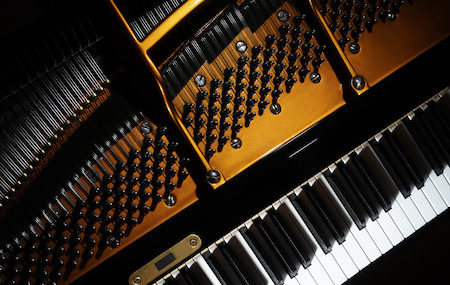Everything is better with music. If that’s your motto, you might have a piano sitting proudly in your home. (Along with a few other instruments!)
If you’re a proud owner of a majestic piano, you know these grand instruments require a little TLC to keep them singing sweetly. It doesn’t matter if they are old or new. A regular piano health check is essential to ensure your keys stay in harmony.
But what does that mean? What does that look like? If you’ve ever faced one of these common piano issues, we have solutions for you.
The Symphony of Sounds
Imagine this: you sit down to play your favorite sonata, only to be greeted by a jarring, off-key note. Don’t fret! All you need is a little fine-tuning.
Like all things musical, Pianos can fall out of tune over time. Changes in humidity, temperature, and even regular playing can cause the tension in the strings to shift.
Calling a professional tuner to work their magic on your piano can bring back its familiar tones and keep it in pitch-perfect condition.
Voicing Woes
Another crucial aspect of your piano’s sound is voicing. Over time, hammers can wear down or harden, affecting the piano’s tonal quality. If you find your piano sounding a bit too bright or mellow, it might be time for voicing adjustments.
This process involves reshaping the hammers to achieve the desired tone. While some enthusiasts dare to embark on voicing adventures themselves, it’s often best left to the skilled hands of a piano technician for optimal results.
The Key to Success
Now, let’s talk about those keys. If you’ve noticed a sticky sensation or a sluggish response when playing, it might be time to roll up your sleeves and dive into a little DIY action. Dust and debris can accumulate between the keys, affecting their movement and overall performance.
A gentle cleaning with a soft brush and a bit of compressed air can work wonders. Avoid oversaturating it with water, as moisture can damage the keys. For a more thorough cleaning, you might want to consult a professional to avoid any key-related mishaps.
Pedal Power
If you find that your sustain pedal isn’t sustaining, it’s time for a checkup. Often, it’s a simple matter of adjusting the pedal or ensuring that the connecting rods are in good shape. However, if you’re unsure about the mechanics, a visit from a piano technician can save you from pedal-related heartache.
The Case of the Creaks and Cracks
Does your piano seem to be speaking its own language with creaks and cracks? This is common, especially for older pianos that have seen a lifetime of melodies.
Wood naturally expands and contracts with changes in humidity, leading to those sometimes disconcerting sounds. Maintaining a stable environment for your piano can alleviate this issue. If the creaks persist, it’s wise to have a technician inspect for any structural concerns.
The Dusty Dilemma
Pianos, like any cherished possession, gather dust. Dust on the soundboard, in the action, and between the keys can impact the piano’s performance. A gentle cleaning routine using a soft cloth and a feather duster can help keep your piano in top-notch condition. Remember, a well-maintained piano is a happy piano!
In the world of pianos, a little preventative care goes a long way. Regular checkups and addressing issues promptly can ensure that your piano continues to be the soulful centerpiece of your home.
Need help finding a reliable tuner? Thinking about restoring your well-loved piano? Or maybe it’s time for an upgrade – we can help. Stop by today.


